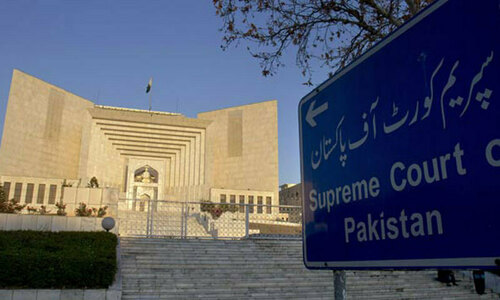ISLAMABAD: Justice Umar Ata Bandial of the Supreme Court observed on Thursday that the proceedings in the sacked employees case had been converted from a review hearing into Article 184(3) jurisdiction in order to safeguard the petitioners’ fundamental right to livelihood.
At the same time, Justice Bandial added, the Supreme Court had a duty to preserve the sanctity of the Constitution and to discourage the recruitment of incompetent persons.
Justice Bandial made these observations during the hearing of a set of petitions seeking review of the court’s Aug 17 judgement that rendered almost 17,000 government employees jobless. The ruling will be delivered on Friday (today).
On the eve of his retirement, Justice Mushir Alam had on Aug 17 declared as illegal and unconstitutional a PPP era law, known as the Sacked Employees (Reinstatement) Ordinance Act 2010 (SERA), under which thousands of people were employed or promoted.
As usual, a large number of sacked employees and their family members, including women and children, waited outside the Supreme Court premises on the Constitution Avenue, steeling themselves to spending yet another chilly night under the skies so that they could hear the court judgement on Friday.
During Thursday’s hearing, Attorney General of Pakistan (AGP) Khalid Jawed Khan said if parliament had no right, what was the need of the Civil Rights Act of 1964 in the United States, which prohibited discrimination in public places and held as discriminatory any employment based on race, colour, religion, sex or national origin.
“The SERA should be seen as an aberration,” the AGP argued, saying that “as a nation we’re prone to such aberration after every 10 years”.
The parliament’s only intent behind restoring these employees was to deliver them of their agony, he said.
Justice Qazi Mohammad Amin Ahmed posed a question whether the parliament could alter the Constitution’s basic structure and whether it enjoyed any adjudicatory authority to create a certain class of citizens.
The AGP replied: “If a law that offers relief to a section of society can cause irreparable damage to the principles of constitutionalism, then go ahead and dismiss these review petitions.”
Rectification of a wrong
The AGP argued that in the parliament’s perception, a wrong was done through en masse termination of thousands of employees by the executive. adding that the court should see SERA as merely the rectification of a wrong done years ago.
He emphasised that contrary to a perception that these employees were appointed in violation of the principles of transparency, all formalities were adhered to.
Justice Syed Mansoor Ali Shah conceded that the parliament could create a class in a downtrodden district in the public interest to reach out to affected people by giving certain jobs.
The weakness in the case was that the majority of the employees were either probationers or employed on contract basis, he said adding neither the employer nor the employee presented any termination letter before the court.
The AGP pleaded that in case the court was considering the compensation aspect in the matter since many of the employees had performed services for ten or more years, it would amount to losing of their jobs altogether.
When Justice Shah stated that the court had yet to understand the wisdom of the parliament behind enacting SERA, the AGP replied it was equally wrong to terminate such a large number of employees with the stroke of a pen.
The AGP emphasised that maximum deference must be shown to parliamentary decisions, adding that the parliament must get the credit where it is due.
The AGP said the court should maintain that the law was sustainable and met the requirements of Articles 9, 14 and 25 of the Constitution. Such a move would save thousands of jobs, he added.
Referring to a set of proposals placed before the apex court on Wednesday, the AGP reiterated the employees from Grade 1–7 should be reinstated, but those from Grade 8 and above would undergo the appointment procedure prescribe by the FPSC.
Published in Dawn, December 17th, 2021












































